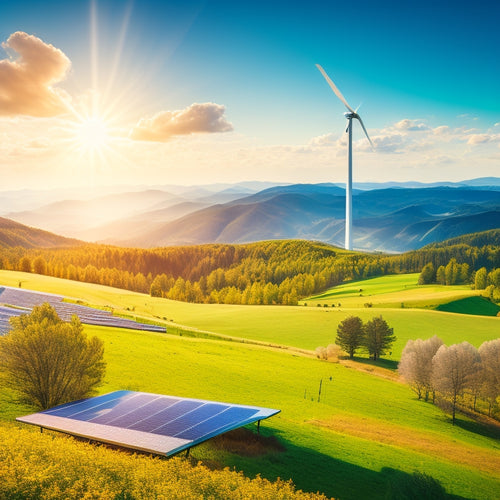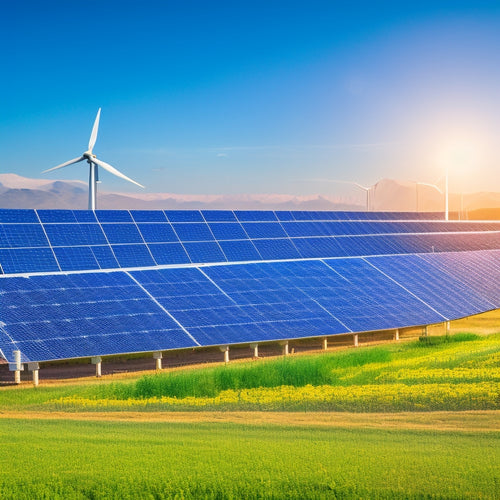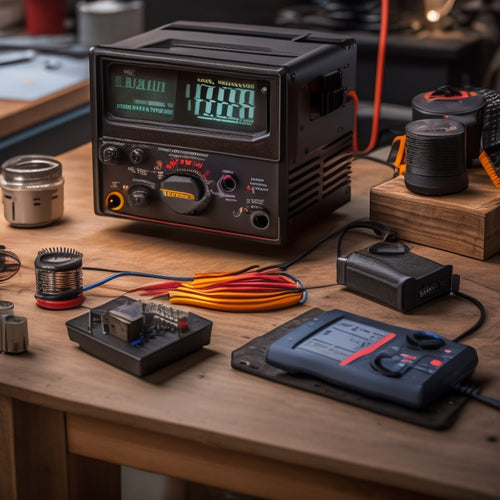
Small Solar System
Share
You're considering a small solar system, which can provide up to 30% energy savings by utilizing clean, renewable energy and reducing your reliance on the grid. By investing in a small solar system, you'll not only minimize your carbon footprint but also reduce your utility bills and enhance your return on investment through government rebates and solar incentives. As you investigate the world of small solar systems, you'll realize the importance of evaluating your energy demands, optimizing energy conversion rates, and understanding daily usage patterns to maximize energy savings. Now, take the next step to reveal the full potential of small solar systems.
The Essentials
- Small solar systems reduce reliance on non-renewable energy sources, promoting sustainability and energy independence.
- Compact designs make small solar systems suitable for homes, cabins, and remote locations, providing reliable low-carbon energy solutions.
- Investing in small solar systems promotes eco-conscious living, lowers energy costs, and provides long-term financial savings through government rebates and incentives.
- Advanced energy storage solutions ensure a reliable power supply, storing excess energy generated during the day for use during evening peaks.
- Optimizing energy conversion rates boosts solar system power output, maximizing energy production and efficiency through high-efficiency photovoltaic cells and proper configuration.
Energy Independence Matters Most
You're likely considering a small solar system to achieve energy independence, which is vital for reducing reliance on non-renewable energy sources.
By utilizing clean energy sources, you'll not only minimize your carbon footprint but also lower your energy costs in the long run.
With a small solar system, you can generate electricity on-site, decreasing your dependence on the grid and saving you money on your utility bills.
Additionally, a home energy system provides a reliable and cost-effective solution, allowing you to enjoy increased energy independence and overcome the unpredictable nature of power outages.
Clean Energy Sources
Several clean energy sources can considerably reduce humanity's reliance on fossil fuels, mitigating climate change and ensuring energy independence. You're likely curious about the various options available.
| Clean Energy Source | Description | Benefits |
|---|---|---|
| Solar Energy | Captures energy from the sun using solar panels | Renewable technology, solar benefits, sustainable practices |
| Wind Energy | Converts wind into electrical energy using turbines | Reduces environmental impact, energy innovations |
| Geothermal Energy | Employs heat from the Earth's core for power generation | Solar incentives, grid integration, community solar |
| Hydro Energy | Generates power from moving water using turbines | Energy storage, solar financing |
These clean energy sources offer a promising alternative to fossil fuels. By leveraging these sustainable practices, you'll not only reduce your environmental impact but also contribute to energy independence.
Lower Energy Costs
Energy independence matters most, and one notable advantage of clean energy sources is their potential to lower energy costs. By investing in a small solar system, you can greatly reduce your utility bills and enjoy financial savings.
Renewable investments like solar energy can provide a substantial return on investment, especially with government rebates and solar incentives. For instance, our Renewable Energy Bundles can provide a thorough solution for homeowners and businesses looking to shift to sustainable energy.
By utilizing the power of the sun and storing excess energy in a battery system, you can guarantee a reliable and renewable source of energy. Before installing a solar system, it's crucial to conduct energy audits to identify areas of energy inefficiency. This will help you optimize your energy consumption and maximize the benefits of your solar investment.
While installation costs may seem intimidating, technology advancements have made solar energy more affordable and efficient. Additionally, solar energy can contribute to grid stability, reducing your reliance on the grid and providing you with a sense of energy independence.
With minimal maintenance requirements, you can enjoy the benefits of solar energy for years to come. By going solar, you're not only reducing your energy costs but also contributing to a cleaner, more sustainable future.
Low Carbon Footprint Guaranteed
You'll appreciate that small solar systems provide an eco-friendly energy source, capturing the power of sunlight to generate electricity without burning fossil fuels.
They employ photovoltaic cells to convert sunlight into electricity, making them an efficient and reliable option for homeowners.
This clean energy production translates to reduced carbon emissions, making a significant impact on the environment.
Eco-Friendly Energy Source
This small solar system is designed to provide a reliable eco-friendly energy source, guaranteeing a low carbon footprint.
You'll benefit from the latest solar panel advancements, which have increased energy output while reducing production costs. As a result, you can enjoy clean energy without breaking the bank.
Renewable energy trends indicate a significant shift towards decentralized power generation. This small solar system enables you to take control of your energy needs, reducing reliance on the grid.
With a compact design, it's perfect for homes, cabins, or remote locations where energy independence is vital.
The system's modular design allows for easy expansion or upgrade as your energy needs evolve. You can monitor and manage your energy production in real-time, optimizing your consumption and reducing waste.
Reduced Carbon Emissions
Carbon emissions from traditional power sources are a notable contributor to climate change. By switching to a small solar system, you're taking an essential step towards reducing your carbon footprint.
With renewable technologies like solar power, you can greatly decrease your reliance on fossil fuels and lower your emission reduction. This energy shift not only benefits the environment but also aligns with your values of eco-conscious living and freedom from pollution.
As you adopt sustainable practices, you'll notice a considerable reduction in your environmental impact. Green initiatives like solar energy can mitigate pollution, supporting climate action and a cleaner future.
By choosing a small solar system, you're investing in a low-carbon future, where energy independence and eco-friendliness go hand-in-hand. With solar power, you'll be contributing to a cleaner, healthier environment, free from the constraints of traditional power sources.
Take control of your energy needs and join the movement towards a cleaner, greener tomorrow.
Maximum 30% Energy Savings
You'll achieve maximum 30% energy savings with our small solar system, thanks to its energy-efficient design that optimizes your energy output.
By analyzing your daily usage patterns, our system guarantees that it captures and stores energy when you need it most, much like an off grid solar system which provides backup power during outages.
This is made possible through the use of deep cycle batteries, which enable our system to store excess energy for later use.
This collaboration of design and usage analysis allows you to reduce your energy consumption and lower your bills.
Energy Efficient Design
Designing a small solar system with energy efficiency in mind can greatly reduce its overall energy consumption. By incorporating sustainable design and passive design principles, you can minimize the system's reliance on non-renewable energy sources. This can be achieved through the use of renewable materials, efficient insulation, and biophilic design elements that maximize natural light and ventilation.
To optimize energy efficiency, consider the following strategies:
| Design Element | Energy Efficiency Benefit | Implementation Tips |
|---|---|---|
| Building Orientation | 10-15% energy savings | Align the system's axis with the Earth's rotation to maximize solar exposure |
| Efficient Insulation | 5-10% energy savings | Use high-performance insulation materials with high R-values |
| Solar Integration | 15-20% energy savings | Integrate solar panels into the system's design to generate electricity |
| Smart Technology | 5-10% energy savings | Implement energy modeling and monitoring systems to optimize energy usage |
Daily Usage Patterns
By understanding how you use energy throughout the day, you can optimize your small solar system to maximize energy savings.
Analyzing your daily usage patterns helps you identify the most energy-intensive periods, typically during morning and evening peaks. This knowledge enables you to adjust your solar panel orientation and energy storage solutions to meet those demands.
Morning peaks usually occur when you wake up and start using appliances like coffee makers and toasters. By orienting your solar panels to capture the morning sun, you can generate more energy during this period.
In the evening, when you return home and turn on lights and electronics, your energy storage solutions can supply the excess energy generated during the day.
Assess Your Energy Demands
You need to determine your daily energy usage to accurately size your small solar system.
To do this, you'll want to analyze your energy consumption patterns, including the amount of energy you use during peak hours and the times of day when you use the most power.
By understanding your energy demands, you can design a system that meets your specific needs and maximizes your energy savings.
With the help of renewable energy systems and battery storage solutions solar energy storage systems, you can reduce your energy bills and utilize the power of the sun.
Daily Energy Usage
Before sizing your small solar system, get a grip on your daily energy usage to guarantee you're generating enough power to meet your needs. Understanding your daily energy usage is essential to designing an effective solar system. You need to identify your energy habits and usage trends to determine the size of the system required.
Start by tracking your energy usage over a period of time, preferably a year, to account for seasonal variations. Monitor your energy consumption patterns, including the time of day and amount of energy used. This will help you identify peak usage periods and average daily energy consumption.
Make a list of all your appliances, lighting, and devices, and their corresponding wattage ratings.
Energy Consumption Patterns
About 30 appliances, lighting, and devices make up the average household, each consuming a specific amount of energy. To optimize your small solar system, you need to understand your energy consumption patterns.
Start by tracking your energy habits to identify areas for improvement. Behavioral changes, such as turning off lights during the day or using energy-efficient appliances, can greatly reduce your consumption trends.
Make lifestyle adjustments to shift your energy usage away from peak hours when possible. Implementing demand management strategies, like staggered appliance usage, can also optimize your energy usage.
By allocating your energy resources efficiently, you can reduce your reliance on non-renewable sources and make the most of your small solar system. Focus on power optimization by identifying areas of inefficiency and making adjustments to minimize waste.
Higher Energy Conversion Rate
You can considerably enhance power output by optimizing your small solar system's energy conversion rate.
This involves selecting high-efficiency photovoltaic cells and configuring them to minimize energy losses.
Boost Power Output
As the demand for energy continues to surge, optimizing power output has become a critical aspect of small solar system design.
You need to maximize your system's energy production to guarantee a reliable and efficient supply of power. To achieve this, you'll want to focus on solar panel optimization. This involves selecting the right panel configuration, angle, and orientation to capture the most sunlight.
Additionally, you'll need to make certain that your system is equipped with advanced energy storage solutions, such as batteries, to store excess energy generated during the day for use during the night or on cloudy days.
Frequently Asked Questions
Can I Install a Small Solar System on My Rented Property?
You can investigate solar panel options for your rented property, but consider installation costs and consult with your landlord, as they may have specific requirements or restrictions on modifying the property.
Do I Need Permission From My Homeowners Association?
As you traverse the path to renewable energy, recall the story of the rebellious flower that bloomed in the cracks of concrete; likewise, you'll need to crack the code of HOA regulations and installation guidelines to guarantee your solar dreams aren't wilted by bureaucratic red tape.
Are Small Solar Systems Suitable for Small Apartments?
When you're living in a small apartment, you're probably wondering if you can still utilize solar power. Fortunately, yes, you can! Compact solar systems prioritize space efficiency, offering substantial energy savings, and are perfect for small apartments, giving you freedom from traditional energy sources.
Can I Expand My Small Solar System in the Future?
As you plan for the future, you'll likely want to upgrade your solar setup - and coincidentally, most systems are designed for scalability, ensuring system compatibility for future upgrades, so you can expand your clean energy capacity with ease.
Are Small Solar Systems Affected by Shading From Trees or Buildings?
When you install solar panels, you'll need to contemplate shading impacts from trees or buildings, which can considerably reduce energy output. You'll want to optimize placement to minimize shading, ensuring maximum energy freedom for your home or business.
Final Thoughts
With a small solar system, you've taken a giant leap towards energy independence. Like a captain charting their own course, you're in control of your energy destiny. By utilizing the power of the sun, you're assured a low carbon footprint and a maximum 30% energy savings. Evaluating your energy demands guarantees a customized solution that maximizes your energy conversion rate. Now, you can steer the future with confidence, your energy needs securely anchored in a cleaner, more sustainable tomorrow.
Related Posts
-

Renewable Energy Solutions to Reduce Your Carbon Footprint
To reduce your carbon footprint, adopting renewable energy solutions is key. Using solar panels or wind turbines can ...
-

The Role of Battery Monitoring Systems in Renewable Energy
Battery monitoring systems play an essential role in renewable energy by enhancing system longevity and optimizing pe...
-

Key Features of a DC to AC Converter
A DC to AC converter features high efficiency and conversion rates, which reduce energy costs and improve performance...


